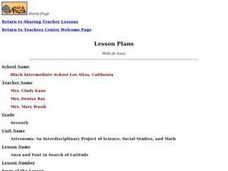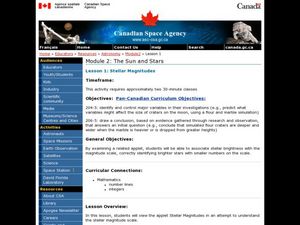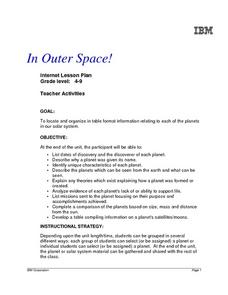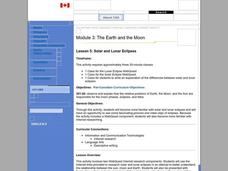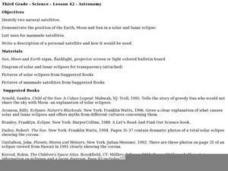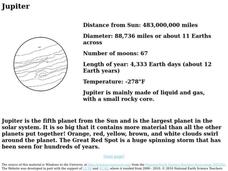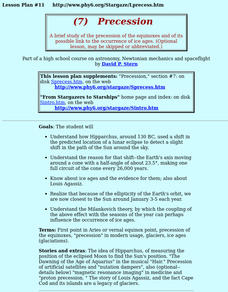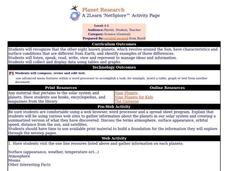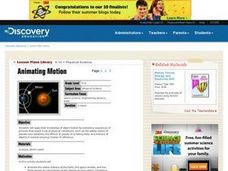Curated OER
Anza and Font in Search of Latitude
This is an integrated lesson that incorporates Social Studies, Science, and Mathematics. In Social Studies, 7th graders complete an online interview and complete an online worksheet about latitude of sites on the Anza trail. In Science...
Curated OER
Galaxies and the Universe
If Earth was formed 4600 million years ago, and the sun revolves about the center of the Milky Way once every 250 million years, how many revolutions have occurred? Students answer this question and ten more, all providing students with...
Curated OER
Large Numbers- the Planets
In this writing distances worksheet, students re-write the chart to show the distance each planet sits from the sun using words rather than numbers, all measurements are in km.
Curated OER
Stellar Magnitudes
Learners analyze the stellar magnitude scale. In this stellar magnitude instructional activity, students examine the stellar magnitude scale. Learners predict the Sun's magnitude from various planets.
Curated OER
Inner Planets
Young scholars create a booklet about the inner planets after researching the characteristics of each planet. Students research the following items for each planet: moons, size, rotation, orbit, atmosphere, an interesting fact. Their...
Curated OER
In Outer Space
Students use the internet to gather information on the solar system. They identify the discoverer and unique characteristics of each planet. They compare and contrast each planet based on size, mass, and distance from the sun. They...
Curated OER
Our Solar System
Students analyze the theories of the formation of the universe and solar system. Students analyze planetary motion and the physical laws that explain that motion: Rotation, Revolution, Apparent diurnal motions of the stars, sun, and...
Curated OER
Solar and Lunar Eclipses
Young scholars complete a WebQuest in order to better explain solar and lunar eclipses. They observe images and videos of eclipses from around the world.
Curated OER
Science - Lesson 42 - Astronomy
Third graders demonstrate the position of the Earth, Moon, and Sun in a solar and lunar eclipse. They list uses for manmade satellites and write a description of how a satellite would be use.
Curated OER
Kepler's Third Law
Young scholars use Kepler's third law to derive the velocity in a circular orbit of any radius, and identify the Earth escape velocity.
Curated OER
Keeping Warm
Students place words describing a range from cold to hot on a scale. Using those words, they identify places on Earth which are cold, hot, freezing or boiling. They practice using and reading a thermometer with three different beakers...
Curated OER
Graphing San Diego Tides
Students observe the tides in San Diego for one month. Using this information, they graph the tides on a chart along with the phases of the moon. They answer questions related to the graph to end the instructional activity.
Curated OER
Space Facts
Students read space facts and click on the links to research more about space objects. In this space lesson plan, students read about comets, planets, the moon, and more.
Curated OER
As the World Turns
Third graders read books and participate in class discussions about the motion of the stars and planets and moons in relation to the Earth. In small groups, 3rd graders act out these movements to music.
Curated OER
Collecting Electromagnetic Radiation
Students using different experiments and activities explore electromagnetic radiation and the effect on the Earth.
Curated OER
"Space" Investigations
Sixth graders understand the patterns of change observable on Earth as a result of the movement of the different bodies in the solar system. They identify the physical characteristics of the different components of the solar system.
Curated OER
Jupiter
In this solar system worksheet, 3rd graders read facts about Jupiter including its position from the sun, the length of its year, and number of moons. They read about its color, clouds, and Red Spot.
Curated OER
Energy Defined
Fourth graders complete activities to study the sources of energy and forms. In this energy activity, 4th graders discuss the origin of energy and define it. Students participate in several experiments to further study energy including a...
Curated OER
Precession
Students explain how Hipparchus, around 130 BC, used a shift in the predicted location of a lunar eclipse to detect a slight shift in the path of the Sun around the sky. They examine the elliptical orbit in which the Earth travels around...
Curated OER
Mars Calendar Project
Learners design a calendar that displays time on Mars. They explore the differences between time on Earth and time on Mars while making the calendar.
Curated OER
Planet Research
Students recognize that the other eight known planets, which revolve around the Sun, have characteristics and surface conditions that are different from Earth; and identify examples of those differences.
Curated OER
Animating Motion
Students apply what they recall about objects in motion by animati ng sequences of pictures that model a set of physical conditions. They animate the orbital motions of the Earth, the space shuttle, and the Moon based on calculations of...
Curated OER
Our Home in the Milky Way
Students gain appreciation of the vastness of our galaxy by viewing an applet about the Milky Way. Students hypothesize about how long it would take to get from Earth to Pluto.
Other popular searches
- Earth Moon Sun System
- Sun Earth and Moon
- Sun Moon Earth
- Earth and Moon and Sun
- Earth, Moon and Sun
- Rubric Sun Moon Earth
- Sun, Earth and Moon
- Sun Earth Moon System


